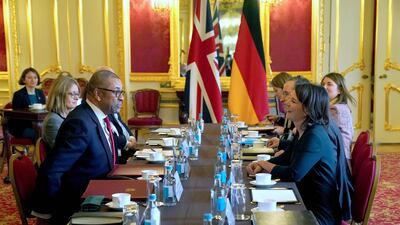Britain and Germany signalled on Thursday that they were willing to make a deal on Northern Ireland and put aside what Berlin called the “Achilles heel” of their post-Brexit ties.
German Foreign Minister Annalena Baerbock was in London for a strategic dialogue meant to relaunch UK-German relations.
But she said Brexit still felt like a death in the family as she implored Britain not to take the nuclear option of tearing up the Northern Ireland Protocol.
She said Britain and Germany's alliance would always be held back until that issue — a trade dispute with far deeper significance for peace, identity and sovereignty on the island of Ireland — is resolved.
While the EU says it will not go beyond adjusting the unpopular trade pact, Britain has not dropped its threat of unilateral action.
However, UK Foreign Secretary James Cleverly said there was a “much more constructive tone” in his talks with the European Commission.
“There is definitely, definitely a desire in the UK and across the EU to get a resolution on this,” he said.
Ms Baerbock said the EU was willing to be flexible and creative to address British concerns, while working within the boundaries of the protocol.
She said the war in Europe had shown the importance of preserving peace, as she urged Mr Cleverly not to breach international commitments while defending the rule of law in Ukraine.
“The implementation of the Northern Ireland Protocol remains the Achilles heel of the EU’s relations with the UK,” she said.
But she told a press conference: “The latest talks between the EU and the United Kingdom had a very positive tone.
“The feeling of having lost a family member remains. But that is life, and I want to make clear that this is history and we have to leave the wounds of the past behind.”
The ministers also discussed Ukraine, Iran, Afghanistan, energy and climate change in what is intended to become an annual strategy meeting.
Britain and Germany have both sent arms to Ukraine and committed as G7 and Nato allies to resisting Russia’s invasion for the long haul, while seeking to curb the Kremlin’s influence on the energy market.
Neither would be drawn on whether they would follow France by sending armoured vehicles to Ukraine, with both saying they would discuss with Ukraine what it needed.
A UK-German cultural commission is set to meet for the first time since 1993, with Ms Baerbock saying she wants to build new bridges for students, researchers and skilled workers to move between the two countries.
Her visit to Britain was meant to take place last year but was delayed repeatedly by upheaval in the UK, and then by bad weather that stranded her at an Irish airport last month.
While in Ireland, she said there was a “window of opportunity” to make a deal on the trade protocol. It came after Mr Cleverly said the “mood music” among officials had improved.
Irish Prime Minister Leo Varadkar took a conciliatory tone this week by saying the EU was ready for compromise and that the protocol was “perhaps a little bit too strict”.

Downing Street welcomed his comments, but Northern Irish unionists remain deeply unhappy over the protocol, which they say loosens ties between Belfast and the British mainland.
The aim of the protocol is to check goods when they enter Northern Ireland so there is no need for controls at the Irish border, which would be politically unacceptable and risk inflaming tension.
But Britain says the checks, demanded by the EU to protect its single market, are too cumbersome, and a bill to override them is still on the table in parliament.
“The protocol was not, is not and will not be supported by unionists,” Jeffrey Donaldson, the leader of Northern Ireland’s Democratic Unionist Party, said this week.
“Whilst Mr Varadkar’s comments indicate he now recognises the political reality in Northern Ireland, we need to see a fundamental change of attitude in the negotiations if we are to see an outcome that is durable.”


